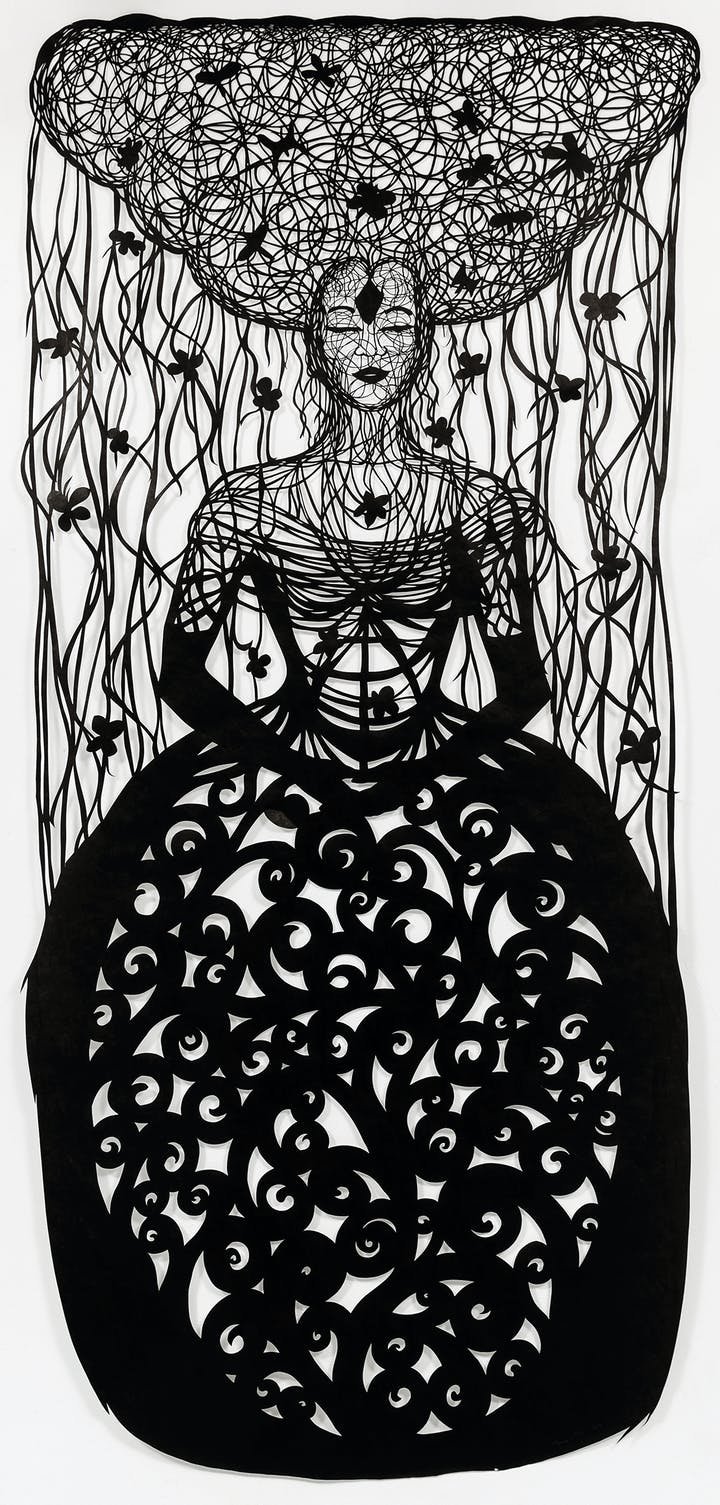The Gifts in Making: Béatrice Coron
Three American artists explain what the notion of the gift means to them, how it shapes their work, and what memorable gifts they’ve received.
Published in American Craft Council, Thursday, December 17, 2020.
This article appears in the December/January 2021 issue of American Craft Magazine.
↑ Béatrice Coron is a paper artist based in New York. Photo: Ric Kallaher
BLISSFUL FLOW
For artist Béatrice Coron, coming to the art of paper-cutting in her late 30s meant that her new pursuit came with the gifts of life experience. “I was not born with a blade in my hand,” she said during her 2011 TED Talk, but she had spent her childhood learning to draw and paint, and had a lifelong love of observing things and capturing their essence in 2D forms.
Grow Your Strength is part of Béatrice Coron’s cut-paper Fashion Warriors series. Photo: Etienne Frossard, courtesy of Béatrice Coron
Coron studied art at the École Nationale Supérieure des Beaux-Arts de Lyon in France and later learned Mandarin at the Université Jean Moulin Lyon 3. She worked at various times as a truck driver and as a shepherdess. She also worked in a factory and as a cleaner, then she moved to New York City at 30 to become a tour guide, after having led travelers in Egypt, Mexico, and China. Wanting to return to the visual arts, Coron chose paper as her medium because it was accessible, affordable, and flexible.
Now an accomplished artist and educator whose work can be found in the collections of the Metropolitan Museum of Art and the J. Paul Getty Museum, Coron’s journey is a story with twists and turns that echo the form of the worlds she fashions from paper and blades. Coron’s cut-paper works each contain a narrative that’s inspired by (but more complex than) a traditional portrait silhouette.
Inspired by Katsushika Hokusai’s Thirty-six Views of Mount Fuji series and Henri Rivière’s The 36 Views of the Eiffel Tower, Coron created a series called 36 Views of the Empire State Building when she arrived in New York. A fellow artist told her that her project was like an artists’ book, and she became intrigued by this lesser-known, but fascinating, art form. She got involved with the Center for Book Arts, where she still teaches, remotely in the time of COVID-19, and started creating cut-paper projects that she assembled into custom boxes.
Coron has also created works of public art, wearable cut-paper jewelry, and clothing. She has delved into paper’s historical and low-tech past by devising new takes on Victorian “paper theaters” and the photographic experiments of William Kentridge, creating works that function like wearable viewfinders.
During the isolation of quarantine, where most American artists now find themselves, Coron has explored the physical forms and shapes of viruses, creating a kind of macabre series of fashion plates called The Fabulous Virus Collection. And she has found the Japanese tradition of Kamishibai or “paper play” – a form of street theater in which a performer narrates a story while moving cut-paper scenes in a small, stage-like box – is an ideal project for quarantine. Kamishibai can be easily seen on a screen for Zoom classes and crafted from materials at hand. “You can use a cereal box,” she says.
Coron created cityscapes of New York’s five boroughs, including Manhattan. Photos: Etienne Frossard, courtesy of Béatrice Coron
Coron enjoys crafting one-of-a-kind pieces for clients to give their loved ones. “People tell me stories about their company or their family, what they did, what they want, what they hope for. They tell me about people who are dead or who are alive,” says Coron, who uses those stories to create wedding invitations, bookmarks, and other gifts. “It triggers a memory to see your stories as a cityscape or a patchwork.”
But the idea of the gift has a further resonance for Coron when she considers her own life and career. She thinks of her first New York commissions, which, as she puts it, “allowed me to be recognized as legitimate,” as valuable gifts – and so are certain qualities in herself. “I’m pretty stubborn and self-driven,” she says. “I don’t give up! And I think those qualities are definitely gifts, partly from what my parents taught me, partly probably genetic.”
“I’m pretty stubborn and self-driven.”
~Béatrice Coron
No doubt those qualities contribute to her ability to stay focused during the laborious and intense process of cutting paper and creating. And, in turn, Coron says paper-cutting gives her the gift of being completely absorbed.
“At first, of course, I’m completely panicked – there’s the commission, the self-doubt, the struggle of creation – all of which is a sort of poison gift,” says Coron. “But then I get to that one moment, where the pain stops, and I am right in the flow or the zone, when I am in harmony with my energy and what I have learned, and I see that my hand can cut steadily. There is a blissful gift in that.”




